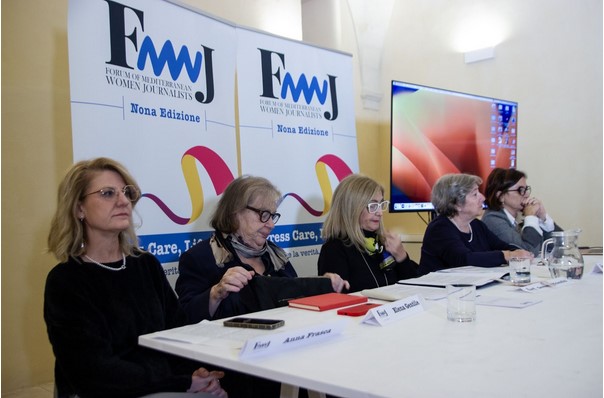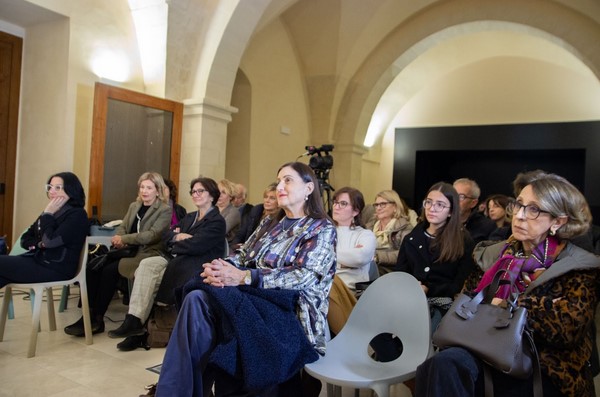A bridge between East and West. This is an idea that pervades the entire Puglia region and, in particular, two cities as rich in history as Bari and Lecce. As fate would have it, the Forum of Mediterranean Women Journalists, held between these two Italian provincial capitals, was just that, a point of union between one end and the other, as José de Espronceda wrote, of this sea.
The first day, held in Bari, took us to sub-Saharan Africa, where feminist movements are gaining strength thanks to women like Désirée Deneo, and where the European media have a lot of work to do, as Antonella Napoli, director of the magazine Focus on Africa, explained. But as Alessia Melchiorre and Iliana Papangeli, two enterprising young journalists, explained in the following panel, it is not always easy to resist the tide of information and pressure. Unfortunately, in Italy, in Greece and all over the world, journalism continues to be threatened by constant pressure and questioning due to a colonial information framework that must gradually disappear.

On the second day of the Forum, also in Bari, we moved from Africa and the central Mediterranean to the Middle East to discuss a conflict that has been in the news for more than 70 years, but which has now gained more momentum than ever: the war in Palestine. As explained by speakers such as Jumana Shaheen and, a little later than expected, the now famous Gazan journalist Bisan Owda. This is the umpteenth humanitarian drama that has hit us journalists hard, not only because we cannot enter Gaza to report on what is happening, but also because more than a hundred of our colleagues have been deliberately targeted in the fighting.
Nor did the Forum forget to put on the table one of those issues which, like the Svevo Castle in Bari, have remained unnoticed by the general public for almost three centuries, despite their size, importance and relevance. In this case, the media too. It is about the struggle of the Kurdish people, the largest ethnic group in the world without its own state. The Forum also addressed this issue with two speakers, Necibe Qeredaxi and Gulistan Ike, who brought to the fore Khineology, a holistic science based on women and one of the ideological foundations of Rojava, the Kurdish administration in north-east Syria. The second day ended with a return to the Forum’s focus on journalism and a conference on how journalism and the new narratives that are emerging can be a pedagogical tool.
The final day of the conferences took place in Lecce, some 150 kilometres south of Bari. The capital of the southern tip of the Salento peninsula, Lecce has a beautiful historic centre that was at its architectural peak in the Baroque period. Its name, Lecce, is said to be related to light. Its history is undoubtedly linked to illumination, both literally and figuratively. The city’s most prosperous period was dominated by olive oil, which was used to light the lanterns of cities all over Europe. And with more than a hundred churches, many of which are attached to convents or monasteries and 40 of which are still active, there is no denying that the Leccesi have always sought divine illumination.
That is why the old Augustinian convent was the perfect place to shed light on the role of women in journalism and in society on the last day of the Forum. Two conferences with names of the stature of former MEP Elena Gentile or journalists who dedicate their lives to improving the conditions of their colleagues, such as Barbara Consarino. It is striking to hear that 87% of Italian journalists interviewed by Alice Fachini claim to suffer from stress, and that the figures are even worse for women or freelance journalists. Another survey by the Italian journalists’ union (FNSI) shows that 85% of freelance women have experienced some kind of sexual discomfort.

A great Catalan journalist once told me that one of the main threats to a journalist is the ego. For many years, the arrogance of journalists has kept universal problems such as those mentioned in these last two Forum conferences on the back burner, so it is time to take these mistakes and tendencies on board in order to remedy them.
Luigi Pappacoda was a powerful archbishop of Lecce who left as his main legacy the cathedral of the city. Pappacoda’s ego was such that he called himself the Pontiff of Lecce. This earned him the enmity of a large part of the city. His great work, the Cathedral, is so dark that most Lecce people today prefer brighter basilicas like Santa Croce. Pappacoda’s ego led him to build a dark cathedral in the city of light, condemning it to a dubious reputation forever. Let us journalists avoid letting our ego corrupt our work and cast doubt on the work of the generations that follow us.


